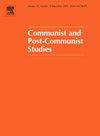Political Positioning of Religious Institutions in Comparative Perspective
IF 1.3
4区 社会学
Q3 INTERNATIONAL RELATIONS
引用次数: 1
Abstract
Existing literature has long debated on religious beliefs and democracy. However, the implications of religious institutions, which shall internally interpret faith and socialize followers and externally decide its political positions with authorities, have yet to be comprehensively explored. By adopting an inter-religious comparison in Hong Kong, this article argues that religious institutions decided to take different positions in response to democratization: Eastern religious organizations, including Buddhism, Taoism, and Confucianism, act as “state defenders” to legitimate government decisions at critical political moments. However, Christian organizations, including Catholicism and Protestantism, act as “state critics” to promote political justice. The Anglican Church is located at “in-between status” with pro-regime leaders but with pro-democracy followers. Consequently, Eastern religious institutions maintain close relations with the authorities, Christian leaders face criticisms from pro-regime associations, and intra-religious tensions within the Anglican Church are intensified. Theoretically, this article moves beyond that, from a “belief-based” perspective on how faith facilitates/hinders democratization to an “organization-based” perspective on how religious institutions choose their political positions in a sub-national hybrid regime. Empirically, this study examines how historical development in the pre-handover era contributed to different religion–state interactions in the post-handover period.比较视角下宗教机构的政治定位
现存文献对宗教信仰和民主进行了长期的争论。然而,宗教机构对内诠释信仰、社会化信徒,对外与权威机构共同决定政治立场,其含义还有待全面探讨。通过对香港的宗教间比较,本文认为,宗教机构决定采取不同的立场来应对民主化:东方宗教组织,包括佛教、道教和儒家,在关键的政治时刻充当合法政府决策的“国家捍卫者”。然而,包括天主教和新教在内的基督教组织充当“国家批评者”,以促进政治正义。英国圣公会处于“中间地位”,既有亲政府的领导人,也有支持民主的追随者。因此,东方宗教机构与当局保持密切关系,基督教领袖面临亲政权协会的批评,圣公会内部的宗教紧张局势加剧。从理论上讲,本文超越了这一点,从“以信仰为基础”的视角研究信仰如何促进/阻碍民主化,转向“以组织为基础”的视角研究宗教机构如何在次国家混合政权中选择其政治立场。实证研究考察了回归前的历史发展对回归后不同时期政教互动的影响。
本文章由计算机程序翻译,如有差异,请以英文原文为准。
求助全文
约1分钟内获得全文
求助全文
来源期刊

Communist and Post-Communist Studies
Multiple-
CiteScore
1.90
自引率
0.00%
发文量
23
期刊介绍:
Communist and Post-Communist Studies is an international journal covering all communist and post-communist states and communist movements, including both their domestic policies and their international relations. It is focused on the analysis of historical as well as current developments in the communist and post-communist world, including ideology, economy and society. It also aims to provide comparative foci on a given subject by inviting comments of a comparative character from scholars specializing in the same subject matter but in different countries.
 求助内容:
求助内容: 应助结果提醒方式:
应助结果提醒方式:


